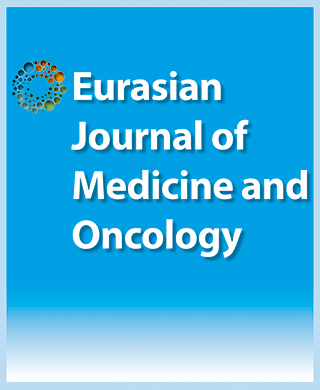

Opioid-Based Analgesia and Cancer Progression: A Mere Experimental Speculation?
Mirko Barone1, Regina Frontera2, Rita Vaia Liouras2, Massimo Ippoliti1, Ivan Dell’Atti2, Luigi Vetrugno2, Salvatore Maurizio Maggiore2, Felice Mucilli11Department of General and Thoracic Surgery, “SS. Annunziata” University Hospital, Chieti, Italy, 2G. d’Annunzio” University, Chieti – Pescara, Italy,
Dear Editor, although less than 25% of oncological patients worldwide actually get a safe and timely diagnosis, surgery still remains an indisputable resource for global cancer care.[1] Opioids represent a milestone in surgical pain management and the interest about their putative prognostic effects in cancer patients has been widely spanked but still claims debate. By providing an optimal sympatholisis as well as pain control during general anesthesia, opioids directly regulate both differentiation and several signalling cellular pathways.[2] Experimental studies have demonstrated activation of transcrip tion factor cascades such as the phosphorylation of the epidermal grow factor receptor (EGFR) resulting in cellular proliferation and cancer survival,[3] as far as neuropithelial cell-transforming gene 1 protein (NET1)-mediated nuclear proteomic effects promoting cell migration by inhibiting tight junction adhesion complexes. In addition, opioids have been shown to stimulate VEGF-dependent angiogenesis.[4] However, several opioids exert antithetical action on the immune system, such as the promotion of apoptosis in selected tumor-cell clones by M1-macrophage activation and promotion of the BAX-Bcl2/caspase-3 pathway.[5] Besides cell-based or experimental models, clinical effects are far from strong evidences and putative hypotheses upon cancer progression relies on discordant and fragmented results, making impossible to argue exhaustive conclusions due to unnegligible immunomodulatory effects on host response. For decades, the extensive use of opioids has been promoted as ideal prototypical resources for analgesia. Besides the pivotal role of opioid-bases strategies, experimental speculation about receptor activation and cancer proliferation, migration and escape effects from im mune system seem to be too far from daily practice due to several concurring factors such as variability into their expression as well as the existence of gene polymorphism making any prognostic association quite un-realistic. Furthermore, variations in tissue opioid receptor concentration would support the hypothesis for a pivotal role for cancer genetic footprint. Du et al.,[6] in a study including resected esophageal cancer patients, reported a significant improvement in both over all (p=0.002, HR=0.346; 95%CI: 0.177-0.676) and recurrent-free survival (p=0.002; HR=0.376; 95%CI: 0.201-0.704) in high-dose fentanyl cohorts. However, at the multivariate analysis, a margin al significant association with intraoperative fentanyl equivalents was found. Similarly, opioid administration has no prognostic role in colorectal cancer. In a propensity-score matched case control study investigating receptor expression, no differences for both ?-opiod receptors (MOR) and opioid growth factor receptors (OGFR) in colorectal cancer was reported.[7] Inconclusive answers have been also found in oro-laryngeal neo plasms. Cata et al.[8] demonstrated only a very weak association between opioid-based analgesia and cancer prognosis after la ryngeal squamous carcinoma surgery (HR=1.001, p=0.02). In con trast, Patino et al.,[9] in a single center study enrolling 268 patients undergoing oral cancer surgery, reported the amount of opioids administered during surgery was not an independent predictor of recurrence free survival (HR=1.27; 95%CI: 0.838 - 1.924; p=0.26). Regarding Non-Small Cell Lung Cancer, in a South Korean retrospec tive study, the amount of opioid usage affected both patients’ gross and stage-adjusted outcome, especially for specific subgroups such as smokers, poor differentiated histology and stage III NSCLC.[10] In this fragmented scenario, putative clinical speculations about prognostic effects of opioid-based analgesia in cancer sur gery would entail a complex setting, where some histotypes may benefit from high-dose opioid strategies, while same drug equivalents would have no or even a negative prognostic impact in other ones, such in case of oral cavity neoplasms. But, com pelling evidences demonstrate endogenous opioids and MOR immunoreactivity could sustain cancer progression. It would be, therefore, impossible to argue about exogenous pharmacologi cal effects without considering co-adjuvants such as biochemical imbalance within cancer microenvironment. In fact, stimulation of activated protein kinases as well as of ex tracellular regulated kinase pathways could promote survival and mitogenic effects.[11] ?-endorphins and their modulatory effects on MORs have been supposed to contribute to metastatization and experimental studies have demonstrated a direct effect on neoplastic hyperalgesia.[12] Although opioid effects on cancer progression have been re ported, several variables such as gene polymorphisms and host responses make experimental evidences about putative detri mental prognostics effect of opioid administration in oncological surgery quite scarce and fragmented with unexhaustive conclu sions claiming further studies and clinical trials.
Cite This Article
Barone M, Frontera R, Liouras R, Ippoliti M, Dell’Atti I, Vetrugno L, et al. Opioid-Based Analgesia and Cancer Progression: A Mere Experimental Speculation?. EJMO. 2023; 7(4): 413-414
Corresponding Author:



